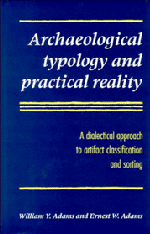 Archaeological Typology and Practical Reality
Archaeological Typology and Practical Reality Book contents
- Frontmatter
- Contents
- List of figures
- List of tables
- The archaeologist's preface
- The philosopher's preface
- PART I Introductory
- PART II The nature of types and typologies
- PART III Typology in action: the Medieval Nubian Pottery Typology
- PART IV Pragmatics of archaeological typology
- PART V Classification, explanation, and theory
- 22 The Typological Debate
- 23 Issues and non-issues in the Typological Debate
- 24 Conceptual problems
- 25 The use and abuse of theory
- 26 Paradigms and progress
- Appendices
- References
- Index
26 - Paradigms and progress
Published online by Cambridge University Press: 23 November 2009
- Frontmatter
- Contents
- List of figures
- List of tables
- The archaeologist's preface
- The philosopher's preface
- PART I Introductory
- PART II The nature of types and typologies
- PART III Typology in action: the Medieval Nubian Pottery Typology
- PART IV Pragmatics of archaeological typology
- PART V Classification, explanation, and theory
- 22 The Typological Debate
- 23 Issues and non-issues in the Typological Debate
- 24 Conceptual problems
- 25 The use and abuse of theory
- 26 Paradigms and progress
- Appendices
- References
- Index
Summary
In the last chapter we applied certain general considerations abut theory and its use to the understanding of how archaeological typologies are developed and used. Here we will reverse the procedure, bringing our findings about archaeological typologies to bear on general issues of scientific theory and method. In particular we will consider their relevance to the currently controversial issue of scientific progress. This issue arises because the “official” or orthodox epistemology of most of the sciences is a vague empiricism, and it is associated with a special conception of scientific progress against which Thomas Kuhn (1962; 1970) and his followers have launched a powerful attack. The empiricist paradigm will be explained in more detail in the next section, following which we will bring some of our own typological considerations to bear in criticizing Kuhn's critique, as well as in commenting on some related issues, and most particularly on the “problem of pseudoproblems” (Carnap 1927). In a short chapter we can hardly offer definitive resolutions to these very general and very fundamental questions, but we feel that insights drawn from our study of archaeological typologies are suggestive enough to warrant remark. We will start with a sketch of “orthodox empiricism” and the conceptions of scientific progress, and of scientific concept formation, that are implicit in it.
- Type
- Chapter
- Information
- Archaeological Typology and Practical RealityA Dialectical Approach to Artifact Classification and Sorting, pp. 314 - 326Publisher: Cambridge University PressPrint publication year: 1991


